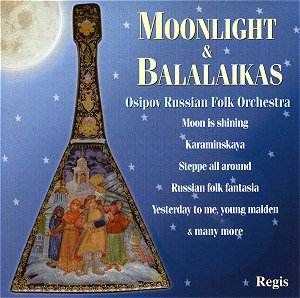Those who already know the work of the Osipov
Russian Folk Orchestra wonít need reminding of the delights they
offer. Nostalgia in spadefuls of course; nobody can touch the
Russians for that commodity. But there is here also a totally
unique and captivating sound-world. The evocative thrum of the
balalaikas predominates, and is the orchestraís most characteristic
tone-colour. But you also have the domra (a smaller type of balalaika),
the gusli, a kind of dulcimer, the bayan, a large accordion type
of instrument, the zhaleika and kugikli, which are primitive woodwind
instruments, and so on. This imparts a rich variety, as well as
an earthy flavour, to the whole thing that makes it immensely
enjoyable.
The playing is wonderfully accomplished and stylish,
and there is some stunning solo work, much of it on the domra,
presumably by Alexander Tzykankov, himself the composer of some
of the works, and a distinguished Russian folk music performer.
His Ditty belies its unassuming title, and is quite a complex,
sophisticated piece of work. Conversely, Fominís Symphonic
Poem, which sounds more pretentious, is in fact an extended
but quite simple exploration of a very beautiful folk-like melody.
Many famous Russian songs make their appearance,
perhaps most notably Kamarinskaya and Pedlars, both
in fine arrangements, respectively by the Osipov brothers and
Vladimir Ditel. For my money, though, the most irresistible number
is Evening Bells, which builds up to a climax of sweeping
grandeur.
OK, I know we are in the realms of higher kitsch
here; but when itís done as brilliantly as this, kitsch
is great! Pour yourself a large vodka (ice and lemon too if
you must), sit back, and ENJOY!
Gwyn Parry-Jones

